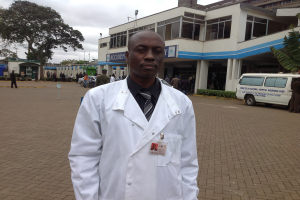Manchester-trained medic helps victims of Kenyan mall siege
01 Oct 2013
Moving first-hand account of terrorist atrocity aftermath

A former PhD student has told how he struggled to cope when faced with the aftermath of the Kenyan mall siege, when he volunteered to treat victims, but added: “I can't help but be grateful for the invaluable training I received at Manchester.”
Dr Innocent Orora Maranga, who completed his PhD at the University’s Institute of Cancer Sciences and now works as consultant gynaecologist in Nairobi, was one of dozens of volunteers – from off duty doctors and medical students to ordinary people offering to give blood – who turned out to help.
Sixty-seven people are known to have died when a terrorist group attacked shoppers in the Westgate mall in Nairobi, and 61 people are believed to be missing.
Afterwards Dr Maranga said: “The Westgate siege is over, thank God, but we still have tens of people still admitted in various hospitals across the city....mostly in Intensive Care Units with serious injuries; mainly gun shot wounds and shrapnel injuries from explosives.
“The most difficult time for me was when I received from an ambulance an injured four-year-old girl with a gun shot wound to her leg. She was in obvious pain but she wasn't crying! She was calm, calmer than most of us who were receiving her. My eyes welled up! All my years of clinical work, the shell that I've spent years building to cushion me from showing emotions, was crushed by her sight and the anger of finding answers why an innocent little baby should needlessly suffer for what she knows nothing about.
“The resolve to live was just too evident in her little eyes...we moved, she survived! “
Dr Maranga completed his PhD under the supervision of Drs Ian and Lynne Hampson at the University’s Institute of Cancer Sciences in Manchester and Dr Peter Gichangi in Nairobi.
He added: “My involvement was mainly on receiving casualties ferried in by numerous ambulances. The first day of the attack was the most chaotic when ten ambulances could arrive at one go. Those on duty couldn't manage by any stretch of imagination.
“But thanks to the many volunteers who arrived simultaneously including the hospital emergency response team, the situation came albeit slowly under control.
“Curious onlookers jammed the hospital to see for themselves what was unfolding – and this at times added to the chaos.
“But I also witnessed first hand the power and resolve of the human spirit in the midst of adversity. Thousands of people were at hand to donate blood, it was challenging to organise them for such exercise. We couldn't possibly turn them away – we stayed late, up to the last donor, well past midnight. I personally wanted to donate but had to wait till the third day after the attack, when we had fewer volunteers.”
And he concluded: “Looking back at what I've seen and experienced over the past few days, I can't help but be grateful for the invaluable training I received in Manchester. Working long hours on my doctorate, staying at it even when results are nothing but discouraging was not in vain.
“The additional training I attended on 'Manchester Leadership Program' came in handy on organizational skills and handling/participating in emergency volunteer situations came into play.
“To cut the long story short, I left Manchester hardened and prepared for a tough merciless world! I have no regrets whatsoever for the four years I spent toiling in Manchester.
“I must stress however, that my contribution in this tragedy was but a small sacrifice, there're many unsung heroes and heroines who went into extraordinary levels to save the hostages. Mine was just that tiny little screw which tightens the spoke of the wheel to enable a bicycle to move!”
Dr Ian Hampson said: “Orora is a fantastic guy who really cares and it has been my great privilege to have been his supervisor. Since then he has become a valued collaborator and also a dear friend.
“He started the Kenyan charity CRT-K which pays for free screening and treatment costs for low-income women with cervical cancer in Kenya. The huge advantage CRT-K has over many other African charities is that the funds will definitely not be misappropriated as they are controlled by scientists and care givers on site in Kenya.”
